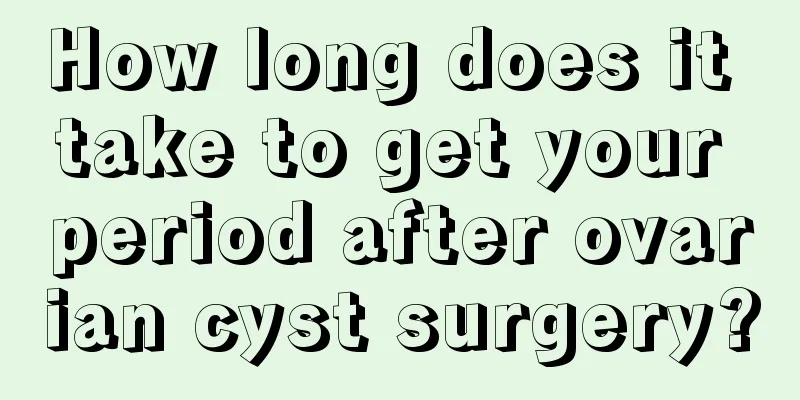Will it be painful for a woman with dysmenorrhea to give birth?

|
Dysmenorrhea is common before and after women's menstrual period. Most women have experienced dysmenorrhea. Some women have severe dysmenorrhea, with nausea, vomiting, and cold sweats, while some women are fine. The older generation often says that women with dysmenorrhea will not feel pain after giving birth. In fact, this is unscientific. The treatment of dysmenorrhea after childbirth is not regular. If women have severe dysmenorrhea in life, it is best to go to the hospital for examination and treatment. For unmarried girls, dysmenorrhea is as painful as a nightmare. There is a traditional saying that has been comforting girls suffering from menstrual cramps. Elderly people will comfort girls suffering from dysmenorrhea by saying: Just hold on for a few more years, and after you get married and have children, the pain will go away. Neither the old people who said these words nor the young girls who heard these words seemed to have thought about such a question: Can having a child really cure dysmenorrhea? Causes of dysmenorrhea: 1. Uterine hypoplasia, cervical stenosis, abnormal uterine position, etc. lead to menstrual blood obstruction or ischemia, resulting in dysmenorrhea. 2. Gynecological diseases such as endometritis, pelvic inflammatory disease, uterine fibroids, etc. cause dysmenorrhea. 3. Abnormal uterine contraction causes uterine ischemia, leading to dysmenorrhea. 4. Genetic factors. A daughter's dysmenorrhea has a lot to do with her mother. 5. Endocrine disorders and increased progesterone in the luteal phase. Will childbirth be more painful for women who experience dysmenorrhea every time they have their menstrual period? There is no necessary connection between childbirth and dysmenorrhea, so this statement has no scientific basis. However, it is recommended to take good care of your body before having children. Is it true that menstrual cramps will go away after giving birth? Dysmenorrhea caused by endocrine disorders, cervical stenosis and abnormal uterine position can indeed be relieved after normal delivery. During pregnancy, the expectant mother's endocrine system will gradually improve and return to normal. During normal childbirth, the fetus passes through the cervical canal, which has a dilating effect and also improves the abnormal position of the uterus. So many mothers report that they no longer have dysmenorrhea after giving birth. What kind of dysmenorrhea can be relieved after childbirth? Dysmenorrhea is mainly caused by uterine contraction. Excessive uterine contraction can also cause uterine spasm. Women in this situation will indeed see significant improvement after giving birth. Some girls are born with an overly curved uterus or an overly tight cervix, which causes menstrual blood to flow out smoothly and leads to dysmenorrhea. After pregnancy, the uterus continues to grow as the fetus grows, and the cervical canal becomes softer, creating conditions for the birth of the fetus; the delivery process also opens the cervix, and the fetus plays a role in expanding the narrow cervical canal, which to a certain extent improves the excessive tilt of the uterus and other positional abnormalities, and menstrual blood will flow much smoother, so for such women, dysmenorrhea will be greatly relieved after delivery. It is not a rule to cure dysmenorrhea by having children Does dysmenorrhea relieve after delivery and mean that women can be cured permanently? Not really. For example, some patients with cervical stenosis may have new adhesions in the cervical canal due to various factors after delivery, which may block the menstrual blood outflow pathway again and cause dysmenorrhea again. This is why some people experience relief from dysmenorrhea for a period of time after giving birth, but then start experiencing dysmenorrhea again. Therefore, “no dysmenorrhea after giving birth” is not a clinical rule. In addition, women who are pregnant or breastfeeding after childbirth do not have menstruation for a long time, and menstruation should be resumed. If dysmenorrhea is caused by tumors in the uterus, endometriosis or endometrial polyps, it will recur and cause dysmenorrhea again. There are two types of dysmenorrhea: one is primary, which means there will be some pain when the period first comes. It is not caused by any disease, but is the pain that accompanies the menarche. Primary dysmenorrhea is often caused by personal carelessness, such as eating raw or cold foods, or doing strenuous exercise. The other type is secondary dysmenorrhea, which refers to pain that occurs after having a disease such as pelvic inflammatory disease, tumor, endometriosis, or having an abortion. The pain of secondary dysmenorrhea is more severe and unbearable than that of primary dysmenorrhea. Secondary dysmenorrhea requires professional medical treatment from a doctor. |
<<: How long does it take to get your period after an abortion?
>>: The harm of staying up late during menstruation
Recommend
What causes women's leg weakness?
Although the living standards are better nowadays...
What causes brown discharge before delivery?
Before giving birth, women will experience some s...
Is it normal for a girl to have her period at 11 years old?
Girls have been having their periods all the time...
What is the reason for thick and bloody vaginal discharge?
Some women have gynecological diseases. If they a...
What medicine is good for uterine cyst?
Female friends are often threatened and harmed by...
What should I do if I get mycoplasma infection in early pregnancy?
If a woman is infected with mycoplasma in the ear...
Prevent cancer before it happens! Do you pay attention to these ten cancer warning signs?
In today's society, cancer is like a ruthless...
Four-dimensional color ultrasound of 6-month-old chicks
Nowadays, more and more pregnant women are doing ...
Introduction to Surgery for Septate Uterus
Do you know about the disease of mediastinal uter...
Asian Games are coming soon, take care of your knees, save this "white list" of knee joint exercises
Hangzhou Asian Games is about to be held If you l...
Delayed menstruation ovulation test paper double bar
If a woman has a regular menstrual cycle but it d...
Can I have an abortion if my white blood cell count is high?
The high white blood cell count in a routine bloo...
What are the benefits of regular dancing? Does dancing affect your height?
Dancing is a combination of exercise and entertai...
What should I do if my menstrual flow is light?
The appearance of menstruation is a good sign for...
Six months pregnant, always urinating
The sixth month of pregnancy is a relatively stab...









